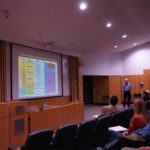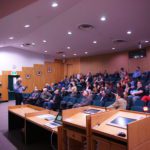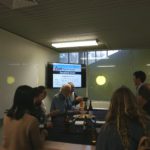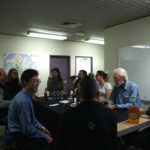CCFS sponsored short course on Snowball Earth, Curtin University, 15 July 2016
A short visit to Curtin University, sponsored by CCFS, allowed Professor Paul Hoffman to present a series of seminars covering a range of aspects of the global climatic phenomenon known as snowball earth. The topics included the geology, climate dynamics, and geobiology (and everything in between) during two possible global glaciations. The event was extremely popular with more than 80 delegates registering their interest in attending the short course, along with a number of others watching the event via a live webcast.
The short course began with a brief introduction by Professor Zheng-Xiang Li before Prof. Hoffman educated the attendees about the chronology, paleogeography, sedimentology, and paleoenvironmental context of Cryogenian glaciations. The history of the idea and the evidence supporting the hypothesis was also introduced.
Following a brief coffee break, we heard about the climate dynamics during snowball earth events. In particular, the importance of the carbon dioxide concentration in the atmosphere was established. The cause and effects were discussed in relation to not only the atmosphere but also the cryosphere, ocean and lithosphere.
The afternoon sessions focused on the geochemistry, snowball ocean acidification, and subsequent deacidification, and the implications on the elemental and isotopic records and cap carbonate production. The presence of eukaryotic organisms living within the ablation zone of the glaciers was also discussed with special respect to how they managed to survive during the snowball earth. Prof. Hoffman followed up this ‘four-course meal’ with a short ‘dessert’ in which the origin of Laurentia was briefly discussed.
The short course generated a number of productive discussions across a broad range of scientific disciplines, many of which were recorded during the seminars. The recordings are available on the following website, or through YouTube.





